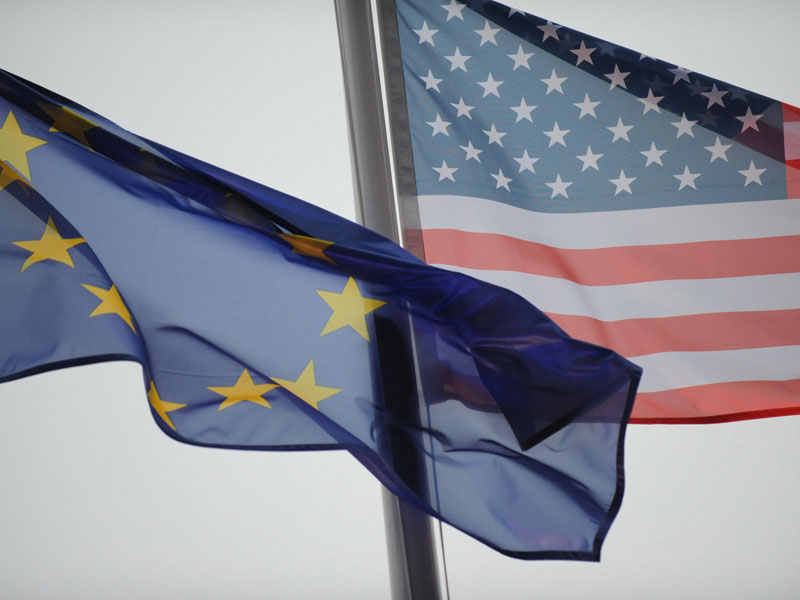
Trade agreement will give banks free rein
“What European negotiators are planning for financial services for a new trade and investment agreement with the United States (the Transatlantic Trade and Investment Partnership (TTIP)) is alarming. It shows how little was learned from the major financial crisis five years after the fall of Lehman Brothers,” says SOMO researcher Myriam Vander Stichele, who is specialised in financial regulations and negotiations in international trade agreements.
The European Committee (on behalf of the European union) has been negotiating with the US to reach an agreement on the Transatlantic Trade and Investment Partnership (TTIP)(opens in new window) since the summer of 2013. The goal is removing barriers for trade and investments in various economic sectors. In addition to import tariffs, the aim is to remove regulations that are seen as being obstructive to the import and export of products and services. Opening both markets for services, including financial services, and public contracts, is being looked at. Another goal is to make investments between the EU and the US easier and to provide a high level of protection to those investors.
Lobby financial industry vs. public interest
Negotiators from the EU and the US meet every couple of months. The last negotiation session took place from 11 to 15 November in Brussels, and the next one will be in Washington from 16 to 20 December. SOMO and other NGOs are monitoring the negotiations as much as is possible. “Although the negotiators consult with a large number of interested parties, the voice of citizens and social organisations is not sufficiently being heard. With regard to trade and investments in financial services, lobbyists from the financial sector (representatives from banks, insurance companies, hedge funds, etc.) are being heard (more clearly) from the negotiators, partly due to the negotiators’ lack of knowledge and insight into the risks. The financial sector has a powerful lobby that always has its wish lists submitted in time”, Vander Stichele explains.
European banks are jumping at the chance to establish themselves in US more easily by having to deal with fewer restricting regulations for selling their (risky) financial products and services. This is also what major investment banks, such as Goldman Sachs, want in Europe. But in view of the current financial crisis, the negotiators should actually be discussing how the agreement can help prevent a financial crisis and which services should be traded and sold in order to benefit civilians and the economy, as well as sustainability.
TTIP risks
Proposals for the TTIP text include articles that were common practice in trade agreements before the start of the financial crisis. The danger was, and thus will be, that governments and parliaments are no longer able to determine or restrict the amount of financial services and the value of financial services transactions, for example. “The more liberal the financial sector becomes, the more risks it will take and the bigger it wants to become in order to compete. And this is exactly what leads to behaviour that can cause or increase financial crises.” Moreover, if the agreement places further restrictions on how and what governments are allowed to regulate, these governments would have too few tools for limiting risks and financial bubbles or financial crises. The lesson of the five year ongoing financial crisis, however, is that governments and parliaments need to have and maintain a strong mandate to (re-)regulate.
Nonetheless, the European negotiators have already clearly indicated that they want to “discipline regulations” and subject them to various conditions in the agreement. In the TTIP, the EU hopes to create a new instrument for discussing EU and US regulations. “As a result, regulations might be discussed behind closed doors and in an undemocratic way, and determine what parliaments can or cannot decide. In the least far-reaching scenario, the EU and the US would accept their mutual legislations.” This means that financial products and banks, or other financial institutions, are automatically accepted to the European market in accordance with US standards, and not in accordance with rules of the EU. In the worst case scenario, the aim is to ‘harmonize’ all financial regulations of both the EU and the US which might result (influenced by the financial lobby) in the lowest common denominator.
Because negotiations for trade agreements are often complex, SOMO drew up a technical memorandum with an overview of issues that are involved in the TTIP negotiations with regard to European financial regulations and the prevention of financial crises.
Read more
- Read the SOMO paper on Transatlantic Trade and Investment Partnership (TTIP)
- More about investor protection is available here (Dutch only).
- Read more about trade agreements and financial services.
- Read an article by Myriam Vander Stichele on the continuing risks in the financial system here(opens in new window) .
- Article EU-US trade deal is race to the bottom
- Article TTIP regulatory cooperation in the financial sector – The EC proposal of 2 October 2013
Do you need more information?
-

Myriam Vander Stichele
Senior Researcher
Related news
-
Why share buybacks are bad for the planet and peoplePosted in category:Opinion
 Myriam Vander StichelePublished on:
Myriam Vander StichelePublished on: Myriam Vander Stichele
Myriam Vander Stichele -
 The Netherlands: European champion share buybackPosted in category:Long read
The Netherlands: European champion share buybackPosted in category:Long read Rodrigo FernandezPublished on:
Rodrigo FernandezPublished on: -
 The trillion-dollar threat of climate change profiteersPosted in category:Long read
The trillion-dollar threat of climate change profiteersPosted in category:Long read Myriam Vander StichelePublished on:
Myriam Vander StichelePublished on:

